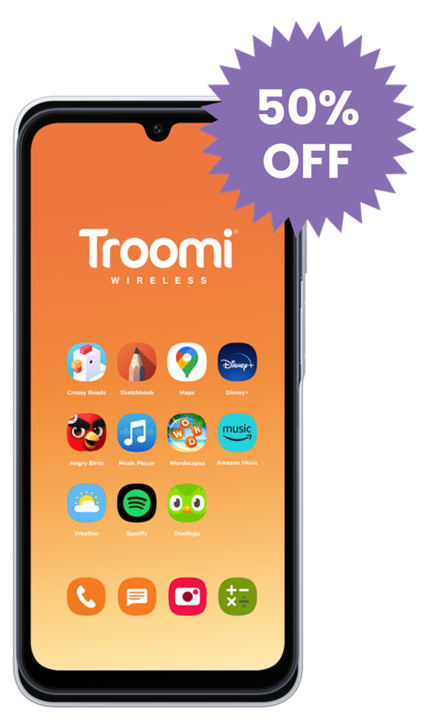Kids spend less time outdoors now than ever before. The average child spends four to seven minutes playing outside each day, compared to a staggering seven and a half hours in front of screens. Technology has its perks, but balancing screen time with offline activities is vital to children’s mental and physical wellness.
Leaving your electronic devices at home and venturing outside is one of the best ways to help your child disconnect and find that balance. Spending time in nature during childhood is correlated with better mental health outcomes in adulthood and many other benefits. Let’s look at just a few reasons to get outside and enjoy green spaces with your kids, plus how to get your child to play outside.
Benefits of Going Outside
Ever wonder why kids should go outside? The positive effects of outdoor activities (to both you and your kids) are far-reaching. Let’s take a closer look at some of the benefits of going outdoors.
Reduced Stress and Anxiety
Have you ever noticed that you feel less stressed after a day outside? It’s not your imagination. Spending at least two hours per week in natural environments is associated with reduced stress levels and better overall health and well-being. Next time you’re feeling glum or anxious, hit your favorite hiking trail with your kids or head to your local park for a family picnic. Improved psychological wellness, along with decreased heart rate, blood pressure, and stress cortisol, are just a few of the perks of getting outside.
Short on time? Microdose! Studies show that just five minutes of viewing green spaces can reduce stress and improve mental health.
Strong Bones
Your child will develop 90% of their lifetime bone mass by the time they reach age 18. Building strong bones during childhood helps prevent fractures and broken bones and lowers the risk of osteoporosis later in life. Experts recommend doing any combination of weight-bearing activities three to four days per week for at least 30 minutes to improve bone density. Playing soccer, jumping rope, running, and hiking are just a few of the ways your child can build strong bones while playing outside.
Immune System Health
Looking for an excuse to get off the beaten path? Venture into the woods for better immunity—one of the unexpected benefits of going outside. Studies have shown that spending time in the forest can improve immune system function. Plants and trees contain—and emit—substances called phytoncides, which protect them against insects and disease. The protective effects of these antimicrobial compounds may also extend to humans. Spending time in the forest is correlated with increased production of natural killer (NK) cells, white blood cells that protect us from viruses, fungi, and even cancerous tumors. Spending time with your kids in the wilderness and boosting their immunity? Total win-win.
Physical Activity
The CDC recommends children get at least an hour of daily exercise, but less than a quarter of them meet this requirement. If your child could use more movement, encourage them to spend time outside; kids who play outdoors get more than double the physical activity of those who play indoors. Playing outside not only results in more exercise but better exercise. When children have varied terrain and plenty of open space, they are more likely to climb, swing, jump, and skip—all of which develop core muscle strength and motor skills. They are also more likely to participate in activities that go against gravity—which might sound scary, but it can be a good thing! When they hang upside down, spin on a swing, or do somersaults, your child develops their vestibular system, which is largely responsible for spatial orientation, movement, and balance.
Sleep Quality
Children who use smartphones or watch TV before bed sleep significantly less than those who don’t. Exposure to unnatural light sources, in general, can lead to poor sleep quality and disruptions in circadian rhythms. So, how can you mitigate the effects of technology and help your kids get better sleep? Research shows that spending time in natural light during the day can help them fall asleep up to two hours earlier at night. In a study on the impact of electrical lighting on circadian clocks, participants who spent a week camping in nature—sans electronic devices—experienced improved sleep patterns. Minimize the amount of time your kids spend on their devices before bed and make sure they have plenty of exposure to natural light during the day. And remember, when they spend time outside, they are more likely to engage in physical activity, which leads to endorphins, which lead to melatonin production, which leads to better ZZZs.
Outdoor Activities for Families
Besides offering health and wellness benefits, getting outside is a great way to create memories and bond with your kids. Wondering how to get your child to play outside? Let’s look at some ways to spend time with your family in the great outdoors.
Visit a State or National Park
There are 423 national parks and 6,600 state parks in the United States. They collectively span almost 100 million acres of land and provide endless opportunities for outdoor adventure. Get out and explore!
Become Citizen Scientists
Collecting data on local animal or plant populations, monitoring water quality, or attending a stargazing party to help chart the night sky are just a few options for getting involved with the science community. Citizenscience.gov, iNaturalist.org, and SciStarter.org are great resources for getting started.
Volunteer for a Trail or Beach Cleanup—or Host Your Own
Create a litter scavenger hunt for your family, organize a neighborhood cleanup, or volunteer for a beach or trail maintenance project. Raising environmental stewards is easier than it looks.
Plant a Garden
Teach your kids patience, science, and responsibility, all while spending time together outside. Studies show that kids who garden eat more fruits and veggies in adulthood. Plus, the whole family will get more exercise. Health benefits abound!
The great news is you can achieve the positive effects of outdoor activities with a small amount of planning and effort. Looking for ways to make time for nature? Help your kids reduce their screen time and reap the benefits of going outside with Troomi’s Parent Portal. You’ll have the ability to control the functionality of their device, set time limits, and teach them to use technology intentionally. Less screen time, more green time.


